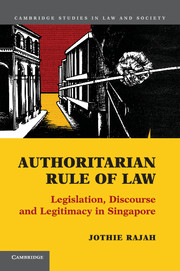Book contents
- Frontmatter
- Contents
- An Insider’s Preface on ‘Rule of Law’ Confusions
- Acknowledgements
- 1 Law, Illiberalism and the Singapore Case
- 2 Law as Discourse
- 3 Punishing Bodies, Securing the Nation
- 4 Policing the Press
- 5 Policing Lawyers, Constraining Citizenship
- 6 Policing Religion
- 7 Entrenching Illiberalism
- 8 Legislation, Illiberalism and Legitimacy
- Bibliography
- Index
- References
6 - Policing Religion
Maintenance of Religious Harmony Act
Published online by Cambridge University Press: 05 June 2012
- Frontmatter
- Contents
- An Insider’s Preface on ‘Rule of Law’ Confusions
- Acknowledgements
- 1 Law, Illiberalism and the Singapore Case
- 2 Law as Discourse
- 3 Punishing Bodies, Securing the Nation
- 4 Policing the Press
- 5 Policing Lawyers, Constraining Citizenship
- 6 Policing Religion
- 7 Entrenching Illiberalism
- 8 Legislation, Illiberalism and Legitimacy
- Bibliography
- Index
- References
Summary
This chapter presents a study of the Maintenance of Religious Harmony Act (or Religious Harmony Act). The Religious Harmony Act, formulated as part of the state’s response to the so-called Marxist conspiracy, became a platform for the state’s discursive construction of ‘religion’ as a national security issue, such that ‘religion’ (like ‘vandalism’, the press and lawyers speaking on ‘law’) became a category of threatening activity requiring anticipatory and preventative action by the state. Just as the state’s response to lawyers in 1986 might be seen as an effort to dismantle an embryonic civil society leadership attaching to lawyers, so too the Religious Harmony Act might be seen as repressing another potential civil society leader: the Catholic Church. This was, after all, the period of the late 1980s, when the Catholic Church had already played a prominent role in the ‘people’s power’ movement that forced Marcos to step down in the Philippines.
In Singapore, the 1980s saw activists from the Catholic Church critiquing the state in terms of its failure to deliver rights and prosperity to an underclass unable to advocate for itself. The state responded to this critique as it had to the Barisan in 1966, the Chinese press in 1971 and the ‘foreign press’ and the Law Society in 1986: It characterised the critics as threats to national security, silenced them and passed a ‘law’ legitimising the state’s positions. The 1991 Religious Harmony Act became the silencing ‘law’ that built upon the coercion of detaining certain Catholic social activists under the Internal Security Act between 1987 and 1990. Before presenting an analysis of the terms of the Religious Harmony Act, the question that must be addressed is, what are the conditions that make a ‘law’ on religious harmony possible in the first place?
- Type
- Chapter
- Information
- Authoritarian Rule of LawLegislation, Discourse and Legitimacy in Singapore, pp. 219 - 258Publisher: Cambridge University PressPrint publication year: 2012



